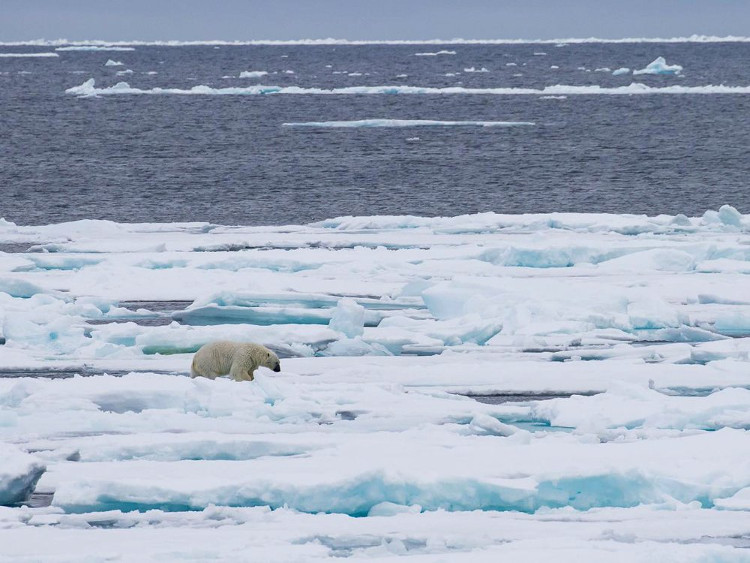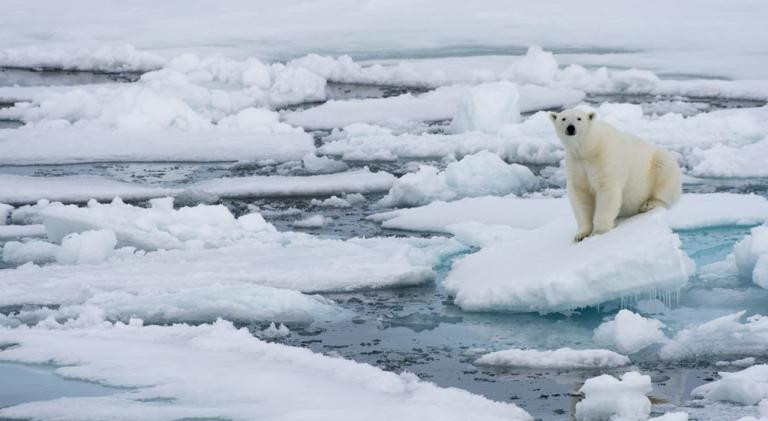For the first time in 100,000 years, the Arctic ice can melt completely
The icy seas of the Arctic are slowly turning into a normal ocean when the ice is melting.
Ice melts in the Arctic which is an inevitable consequence of global warming and a changing global climate. But who dares to think that one day the ice here will completely disappear?
But recently, experts have officially warned that for the first time in 100,000 years, the Arctic ice will completely disappear. And more horribly, it will happen right this year or 2017.

Melting ice will push polar bears into extinction.
According to data from satellites conducted by the National Snow and Ice Center, as of June 2016, the Arctic ice sheet accounted for only 11.1 million km 2 , while the average figure in the last 30 years This is 12.7 million. And that 1.5 million "tiny" is equivalent to more than 6 times the area of the entire United Kingdom.
According to Professor Peter Wadhams of the University of Cambridge (UK), this number is slowly proving his controversial prediction 4 years ago is the truth."My prediction at that time is that the Arctic ice will completely disappear, or it will shrink to just 1 million square kilometers in September this year," he said.

The last time the Arctic region without ice was 100,000 - 120,000 years ago.
He added: "Even if the ice does not disappear, it will still be a year of ice in the Arctic falling to a record low. I believe the area of ice covered will be less than 3.4 million km. 2 (the current lowest ice record). And if not this year, it will be in the next year. "
The last time the Arctic region without ice was 100,000 - 120,000 years ago. According to experts, the sea ice areas in northern Russia no longer exist, making the sea currents become warmer . In addition, the frozen methane layer under the continental shelf is also gradually rising at an alarming rate.

The frozen methane layer under the continental shelf is also gradually rising at an alarming rate.
In addition, the melting of the ice means that the Earth's surface becomes darker, which means the heat absorbed from the Sun will be more. According to a previous study by Wadhams, the whole process could cause the Earth's temperature to rise by 0.6 degrees Celsius for five years - a very worrying number.
However, Professor Jennifer Francis of Rutgers University (USA), who has long studied the polar and Northern Hemisphere weather, said that Wadhams' predictions will not be possible at least until 2030 period. - 2050.
But even so, Francis agreed on the situation of the Arctic today. She said: "The ice here is very low and continues to record from January to May this year, so this is very worrying. I think of September, the possibility of falling ice The lowest level is possible. "
The study is published in Nature.
- From now until 2080, the Arctic ice can melt completely
- For the first time in history, there may be no Arctic
- Arctic will melt ice after 5 years
- The Arctic temperature is the highest in 44,000 years
- In 40 years the Arctic will run out of ice?
- Ice melted massively, 100 years from now, will the Arctic still have ice?
- Arctic ice will melt?
- The Arctic may run out of ice within a decade
- The Arctic lost three times as much ice as Belgium every day
- Perennial ice in the Arctic is disappearing
- Every second 14,000 tons of water flows into the sea because the Arctic ice melts
- Ice in the Arctic is likely to disappear by 2030
 Is the magnetic North Pole shift dangerous to humanity?
Is the magnetic North Pole shift dangerous to humanity? Washington legalizes the recycling of human bodies into fertilizer
Washington legalizes the recycling of human bodies into fertilizer Lightning stone - the mysterious guest
Lightning stone - the mysterious guest Stunned by the mysterious sunset, strange appearance
Stunned by the mysterious sunset, strange appearance